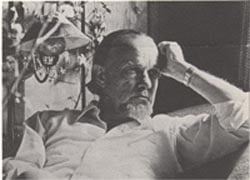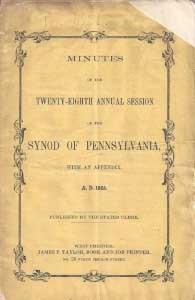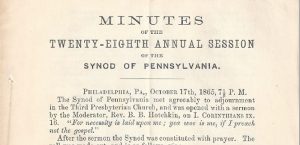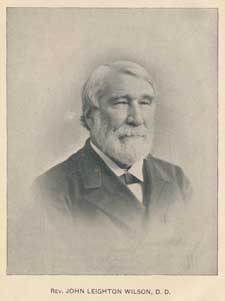Living in an Abnormal World
May 15th marks the death of Dr. Francis A. Schaeffer, in 1984. Dr. Schaeffer and Dr. Robert G. Rayburn were close friends who had gone through many challenges together, as Dr. Rayburn relates here in the following eulogy, delivered in memory of Dr. Schaeffer. What is not told here in Rayburn’s eulogy is how they both faced death in the early 1980’s, both men having been diagnosed with cancer, and how Schaeffer continued to prove himself a constant friend, writing to Rayburn to encourage him. About three years before his own death, Dr. Schaeffer wrote, upon hearing of a recurrence of Rayburn’s cancer:—
“Living this way has one advantage and that is we have had brought into sharp focus the reality of what is true for everybody from conception onward and that is that we are all mortal in this abnormal world.”
Dr. Robert G. Rayburn’s Eulogy for Francis Schaeffer:
 My first contact with Francis Schaeffer came at a very critical time in my life. I had just suffered an experience which had a shattering effect upon me. I had been tried and deposed from the ministry of the denomination in which I was born, reared and educated and in which I had served as a chaplain on the battlefields of World War II. I was still in the uniform of my country when the sentence of deposition was pronounced upon me by my presbytery. Actually, I was declared guilty and deposed from the ministry for thinking about doing something which I had never done! No word of proof was ever introduced into the trial which established the fact that I had violated my ordination vows. My “guilt” was established entirely on my admission that I had written a letter in which I indicated deep distress over the growing liberalism in my denomination and confessed that I had seriously considered leaving it.
My first contact with Francis Schaeffer came at a very critical time in my life. I had just suffered an experience which had a shattering effect upon me. I had been tried and deposed from the ministry of the denomination in which I was born, reared and educated and in which I had served as a chaplain on the battlefields of World War II. I was still in the uniform of my country when the sentence of deposition was pronounced upon me by my presbytery. Actually, I was declared guilty and deposed from the ministry for thinking about doing something which I had never done! No word of proof was ever introduced into the trial which established the fact that I had violated my ordination vows. My “guilt” was established entirely on my admission that I had written a letter in which I indicated deep distress over the growing liberalism in my denomination and confessed that I had seriously considered leaving it.
It would be difficult for anyone who had not passed through the experience of being stripped of his ministerial standing and told he was not welcome in the church he had sought to serve faithfully to understand what a traumatic incident this was in my life. The details of that episode in my life do not belong here. What is of deep significance to me is the fact that although he had never known me personally, when Francis Schaeffer learned of the action of my presbytery, he came to see me traveling the considerable distance from St. Louis where he was pastor of a growing congregation to Texas where my trial had been held and where I was endeavoring to decide what my future ministry was to be.
Although Francis had never personally experienced the shock of ecclesiastical censure, I was impressed almost immediately with the fact that here was a man who seemed to have grasped the reality of genuine Christian empathy. He could and did “rejoice with those who rejoice and weep with those who weep.”
He was quite willing for me to share with him the details of the event which had both grieved and humiliated me. He understood my pain. At the same time he kept reminding me of the never-faiiing love of the Lord and of His promises never to forsake those who are His very own. He reminded me that I had preached to others the never-failing grace of God and gently called me to that implicit trust in God which I had entreated others to demonstrate in their lives. I had never before experienced such an amazing combination of deep understanding based upon genuine Christian love and absolute loyalty to the sure word of Scripture. Francis and I sat alone for several hours sharing our thoughts. We continued this fellowship as we went for a long walk together. From that day on we were close friends!
Another aspect of Francis Schaeffer’s character became clear to me when it came time for me to be examined for reception into the presbytery of the small denomination in which he was a teaching elder. His personal vital interest in me had been a major factor in my decision to seek membership in the Bible Presbyterian Church, yet I realized that there were some potential doctrinal problems. I had come under the strong influence of Dr. Lewis Sperry Chafer while doing my graduate work at Dallas Seminary and had embraced a substantial amount of his dispensational theology, enough so that I could be granted a degree from the seminary. I had been uneasy about certain points of doctrine in the dispensational system but had resolved to work out my problems in further study when I returned to the pastorate. I shared my concerns with Francis and discovered in him a wonderful willingness to be patient with my lack of precision in some areas of doctrine. On long walks together he questioned me carefully and thoroughly on all of the major doctrines of Presbyterianism as set forth in the Westminster Confession of Faith and Catechisms, and because I held firmly to such distinctive doctrines as infant baptism and the so-called five points of Calvinism, he assured me that he felt I could come to more fully understand the unique facets of Covenant Theology as a member of the presbytery and that he would use his influence in the presbytery to bring about my reception. There was both kindness and patience manifest in his attitude.
It was not long before I had justified his confidence by embracing thoroughly the Reformed doctrine of the Westminster Standards in all details. I have asked myself many times since whether I would have the same patience and understanding with a young minister seeking admission to my presbytery that Francis Schaeffer manifested with me.
It was not long after I became a member of the Bible Presbyterian Church that a crisis developed and a division occurred which had profound effects upon the lives of both Francis Schaeffer and me. He had resigned his pastorate in St. Louis and had gone to Europe to work with children, thinking that this kind of evangelistic activity provided perhaps the best hope of exerting a strong influence on European society and bringing back a powerful evangelistic witness in the Protestant churches of that continent. I had been summarily and involuntarily called from my pastorate to return to the army chaplaincy and had spent several months on the battlefields of Korea where God had richly blessed the preaching of the Word.
Returning to civilian life I accepted the presidency of a small struggling college in Pasadena, California, which had been established by energetic minsters and laymen in my own denomination. The school was independent of denominational control, but I was assured by the board of trustees that it was founded to further the purposes of my denomination. This was a vital challenge.
As I once again became able to be active in the courts of my church, I began to be troubled by several things which were taking place, particularly in our participation in two small interdenominational councils of churches on both the national and world level. A discussion of these issues is not necessary here. It is of interest, however, that when I wrote to Francis about these concerns, he answered immediately assuring me that he was deeply troubled about the same matters, and he was looking at our church and its activities from a European perspective. In our correspondence we continued to share items from both continents which troubled us. Our principal concern was the honor of the Lord and the realization that He could not bless us as we needed to be blessed unless our denominational programs were conducted in complete accord with the high standards of the Word of God.
In the providence of God the Schaeffers returned to the States for a few weeks, and we invited Francis to come to preach the Word of God in southern California. Then we made arrangements to drive together across the continent to South Carolina for the annual meeting of the Synod of our denomination. I had been elected by the Synod the previous year to a place on the church’s delegation to the American Council of Christian Churches. Sensing my responsibility in this position, I had made serious inquiries into the activities of this association, and the more I learned the more disturbed I became. On our trip across the country we shared the information we had acquired, Schaeffer on the international scene with the work of the International Council of Churches, and I on the national activities of the American Council. We heartily agreed that the church must be aroused to the need of purifying its witness.
Since I was an official delegate of the denomination and therefore had the obligation to report my findings to the Synod, it was obvious that I had the responsibility to alert the church to the problems and sound a warning concerning the need for reform in certain areas if we were going to experience the blessing of the Lord. Neither Francis nor I had expressed any desire for anything but a recognition of the problems and a change in some of the policies of the council. Both of us were convinced that the testimony of these interdenominational councils was valuable and much needed. The changes we desired were to bring the work more fully under the blessing of God.
After I gave my report to the Synod, however, a wave of accusations against Francis Schaeffer and me swept over the church. It came largely from Dr. Carl McIntire in his paper The Christian Beacon, but his charges were echoed by those in the denomination who accepted his analysis of the situation without carefully examining the facts which had been presented.
It was then that i learned how completely lacking in a vindictive spirit Francis Schaeffer was and how forbearing he was in the face of false charges. He was denounced as having plotted with me to take over the denominational leadership. He was accused of putting me up to formulating the report which I had given so that it would enhance his leadership in the church and in the International Council. None of the charges had any basis in fact. It was a blessing to me, however, to observe how unconcerned Schaeffer was in defending himself. His continuing concern was to remove from the church any activities which did not reflect the glory of the Lord. As we prayed together in the fellowship of our long journey, our concern was entirely for the spiritual well-being of the church which both of us loved.
The tragic results of the bitter denunciations which were hurled against Schaeffer and me need not occupy our attention here. Dr. Schaeffer returned to Europe where fortunately he was beyond the reach of anyone who might want to punish him for being implicated with me in disturbing the church. The Bible Presbyterian Church at its Synod voted decisively to demand some changes in the policies of the American and International Councils. It was not long, of course, before Dr. McIntire led a small group of his followers out of the church and formed another denomination using the same name. Our denomination changed its name to avoid confusion and soon merged with another small denomination and became the Reformed Presbyterian Church, Evangelical Synod, which was blessed with steady growth and in recent years has merged with the Presbyterian Church in America. In all of this progress Dr. Schaeffer’s influence has been strongly felt as in his correspondence as well as his occasional trips to the U.S.A. he has encouraged ministers and laymen alike to demonstrate their loyalty to the Scriptures and their love for one another.
When it came time for my two daughters to go to college, it was the desire of their mother and me for them to have an opportunity to gain a good command of a foreign language and to be exposed to European culture with all of its refinements in music, art, and literature. Because of the closeness of the friendship which had developed between Francis Schaeffer and me, I felt free to ask him for a special personal favor. We were unwilling to send our young daughters to one of the European universities where they would be subjected to pagan influences with little or nothing to encourage them in their Christian lives. Knowing that the Schaeffers had opened their home high in the Swiss Alps for a ministry to young people from all over the world, I asked them for that special care for our daughters as they studied at the University of Lausanne which would make it possible for them to spend their weekends with the Schaeffers. To this they responded with happy agreement and the assurance that our daughters would be treated as their own. Both of them feel a deep debt of gratitude to Dr. and Mrs. Schaeffer as do we. Their lives were enriched and their spiritual discernment deepened by their months of fellowship in the Schaeffer home.
As the Lord blessed the faithful witness of the Schaeffer’s at L’Abri and more and more troubled young people began to feel the impact of the life and teachings of this godly man and his wife, he began to be well known in many parts of the world. Young men and women whose lives had been radically changed by the regenerating work of the Holy Spirit during their time at L’Abri began returning to their homes and joining the evangelical churches and spreading the word of God’s amazing work through the ministry of the Schaeffers.
It was one of the blessings of my personal friendship with Francis Schaeffer that I was able to interest him in widening his influence by coming to teach at Covenant Theological Seminary on a regular basis for a few weeks every two years. This he did for some time to the great blessing of our student body and the faculty as well.
He became something of a celebrity in the Christian world and because of his enthusiastic endorsement of Covenant Seminary, we began to receive student applications from many men who had become Christians or had their Christian commitment deepened at L’Abri. Indeed, we soon found that Dr. Schaeffer was our most effective recruiter of seminary students. In our personal correspondence he continued to share his observations of movements in the theological world and his concern for the contnued faithfulness of our institution in doctrine, but also in Spirit-filled living.
During his frequent visits to our campus, he and Mrs. Schaeffer were always guests in our home, and we had many opportunities to observe their selfless consideration for others. They received telephone calls form people in many parts of the land who sought their aid in their spiritual problems and in their battles with evil. I remember one particular occasion very vividly. Dr. Schaeffer was on the telephone for nearly three hours with a deeply distressed man in Florida who had just lost his wife after having been assured by a “faith healer” that she had been cured. Schaeffer was unwilling to terminate the long telephone conversation until he had some assurance that the comfort of God’s Word had touched the heart and mind of the needy widower.
Some years ago a young man came to Covenant Seminary to pursue theological studies, and it was apparent early in my contact with him that he had an unusually sharp intellect. Knowing that he had been reared a Roman Catholic and had turned away from that faith to atheism and existentialism, I inquired as to his spiritual pilgrimage. He told me that he had gone to Paris to study with Sartre and other existentialists there hoping to find some meaning in his life, but his studies and contacts in Paris had only driven him deep into despair. Through a casual (but obviously providential) encounter with a stranger in Paris to whom he confessed his deep despair, he was advised to go to a little mountain village in Switzerland where he would come in contact with a man who could certainly answer his questions and provide him with meaning for life. He soon found himself at L’Abri listening intently to Francis Schaeffer, asking questions and frequently raising objections to what he heard. I asked then how he was brought to personal faith in Christ.
“It was not by the strength of the intellectual arguments which I heard,” he answered. “I still had questions, plenty of them. But it was the love of this man, Dr. Schaeffer, that touched my heart and made me see the reality of the living Saviour he talked about. He would spend hours with me, and he never seemed to grow weary of my almost endless questions. I couldn’t resist the love of Christ when I experienced it in this man.”
I am not unaware of the fact that Dr. Francis Schaeffer has been criticized by some and even ridiculed by a few who fail to recognize the immense impact of his life upon our generation. I have only deep gratitude in my heart for the way my own life has been enriched and blessed by this godly man. I am truly thankful for all those who share with me deep appreciation for the way the Holy Spirit has made manifest the living presence of the Lord Jesus Christ in the life of Francis Schaeffer. He leaves behind for those who did not know him personally his written works, and in the memory of all of us who knew him and loved him, he leaves behind the aroma of his godly walk with his Lord and Saviour.
Words to Live By:
In our introduction we referenced a letter that Dr. Schaeffer wrote to Dr. Rayburn in 1981. Toward the close of that letter, Schaeffer said this:—
“…yet I am also increasingly conscious of the fact that Edith and I have been, as it were, carried along on an escalator for the entirety of our lives. I am left in awe and wonder with all this, and I very much feel the escalator is still in operation, not just in this matter of health, but in the battles that beset us on every side.”
The steps of a good man are ordered by the Lord; and he delighteth in his way. (Psalm 37:23, KJV)
I will both lay me down in peace, and sleep; for Thou, Lord, only makest me dwell in safety. (Psalm 4:8, KJV)
 During the course of your web-surfing or reading about Presbyterian history you may have run across the terms, “Old School” and “New School,” or their abbreviations, “OS” and “NS.” Before getting to the purpose of this post, which is the PDF download of the minutes of the Synod of Pennsylvania, New School, a brief explanation of the terms “New School” and “Old School” may be beneficial.
During the course of your web-surfing or reading about Presbyterian history you may have run across the terms, “Old School” and “New School,” or their abbreviations, “OS” and “NS.” Before getting to the purpose of this post, which is the PDF download of the minutes of the Synod of Pennsylvania, New School, a brief explanation of the terms “New School” and “Old School” may be beneficial. When the Synod of Pennsylvania, New School, convened in the evening of Tuesday, October 17, 1865, in the Third Presbyterian Church, Philadelphia, the retiring moderator, B. B. Hotchkin, the pastor of the Marple Church, passed the gavel to Rev. Thomas J. Shepherd of First Church in the Northern Liberties, Philadelphia. The meeting was particularly significant because it was the first annual meeting following the Civil War, the assassination of President Lincoln, and the inauguration of Vice President Andrew Johnson to the presidency. Since the previous synod meeting there were many things that had changed. For the New School, one of, if not the key issue for its identity, abolition of slavery, had been achieved. There was some optimism in the land about the future, especially if one lived north of the Mason-Dixon Line, but the optimism was tenuously mixed with different ideas about how the post-war situation with the Southern states should be handled. In the North, many adamantly contended that the former Confederacy should pay a heavy price, but on the other end were others desiring to see all the states working together as a reunified nation. In the South, there were many fearing retribution, wondering if they would have food, and apprehensive of finding work in the devastated economy, however, there were also numerous others consumed with anger against the North. Between the two poles of ideas in both North and South were a myriad of other perspectives.
When the Synod of Pennsylvania, New School, convened in the evening of Tuesday, October 17, 1865, in the Third Presbyterian Church, Philadelphia, the retiring moderator, B. B. Hotchkin, the pastor of the Marple Church, passed the gavel to Rev. Thomas J. Shepherd of First Church in the Northern Liberties, Philadelphia. The meeting was particularly significant because it was the first annual meeting following the Civil War, the assassination of President Lincoln, and the inauguration of Vice President Andrew Johnson to the presidency. Since the previous synod meeting there were many things that had changed. For the New School, one of, if not the key issue for its identity, abolition of slavery, had been achieved. There was some optimism in the land about the future, especially if one lived north of the Mason-Dixon Line, but the optimism was tenuously mixed with different ideas about how the post-war situation with the Southern states should be handled. In the North, many adamantly contended that the former Confederacy should pay a heavy price, but on the other end were others desiring to see all the states working together as a reunified nation. In the South, there were many fearing retribution, wondering if they would have food, and apprehensive of finding work in the devastated economy, however, there were also numerous others consumed with anger against the North. Between the two poles of ideas in both North and South were a myriad of other perspectives.
![Robert Baird [6 October 1798 - 15 March 1863]](https://thisday.pcahistory.org/wp-content/uploads/2012/10/bairdRobert.jpg)

